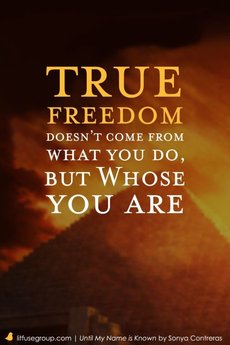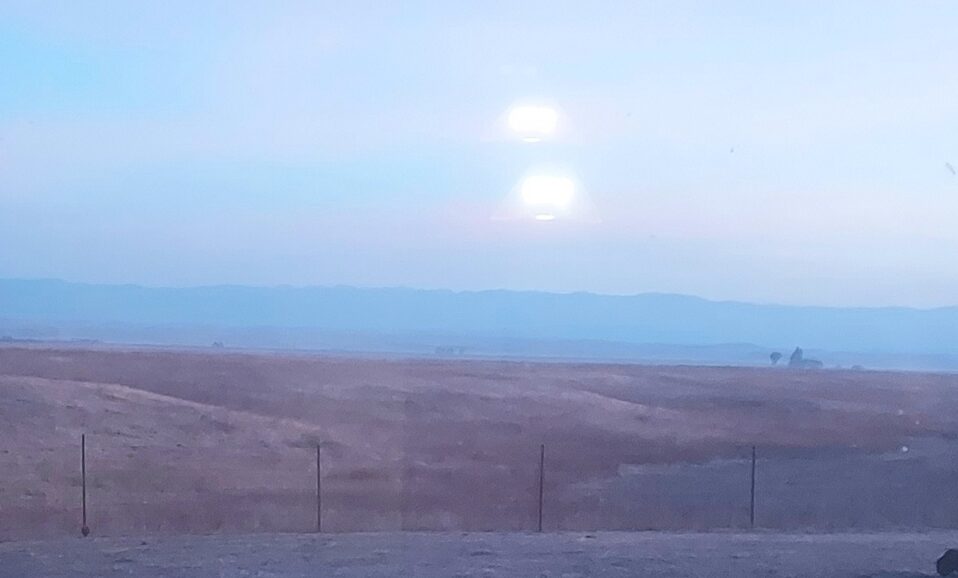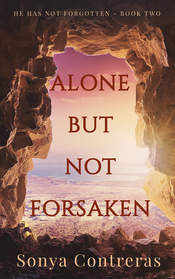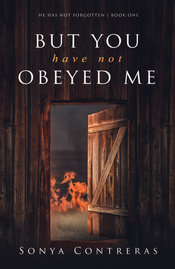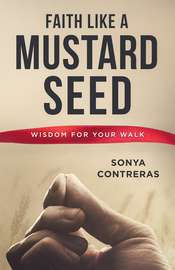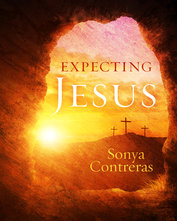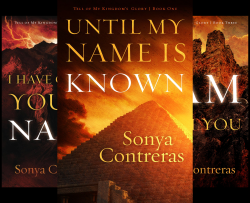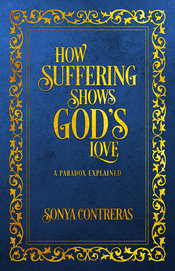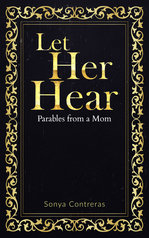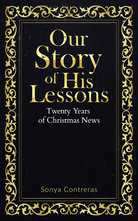- Home
- Index
-
My Books
- Book List
- Writing/Reading Articles Listing
-
My Short Stories
- What God Lost
- What God Lost — Part 2
- When Hope Was Lost
- A Battle in the Heavens
- To Live Forever
- Finding Peace
- Empty Hands
- From Fire and Thunder to Love and Submission
- The Coming One
- Forgiveness Made Possible
- The Innkeeper's Wife
- Do You Have The Right Words?
- The Lamb of God As Told by a Scribe
- What Love Is This?
- When Heaven Came Down
- Family
- Faith

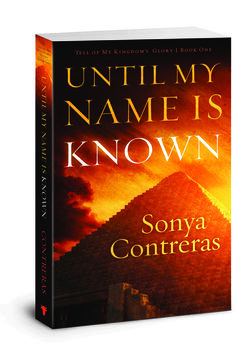
Chapter 1
Zipporah paused, stirring the lamb stew bubbling in a pot over the fire outside her dry-mortared dwelling. She smelled the dried rosemary as she crumbled it to add to the stew.
“Is that Father?” Gershom pointed to a lone figure running down the hillside.
She looked where her son pointed. Her heart pounded. Moses was returning home early. What was wrong?
“Zipporah!” he yelled as he panted for breath.
She dropped her spoon. “Gershom, stay with the baby.” She raised her ankle-length tunic to run.
When she reached Moses, she clutched his arm. “What is it? Where are the flocks?”
She looked into his eyes gleaming with a fire not his own. His face flushed with color, not just from running.
“God appeared unto me!” Moses grabbed her waist and swung her in circles. His beard tickled her neck.
She squealed.
He laughed. He smelled of sheep, dust, and sunshine.
Zipporah grabbed his shoulders as he continued to twirl her. “Moses, stop! You’re making my head spin.”
His demeanor grew somber. He stopped twirling her, suddenly serious. “I saw the Lord, the Lord God Almighty. He spoke to me.”
“What do you mean? No one sees God and lives.” She touched his flushed face. Was he feverish?
He gently lowered her feet to the ground. “He gave me a mission.” He put his arm around her waist and guided her toward their house. “I saw a light flickering like a star. I went to see. It was a bush on fire, but without ashes. Yet it burned. I drew closer.”
Fire brought death in pastures where rains fell only in the rainy season. Zipporah smelled for smoke. His cloak did not smell of smoke. Had he dreamed this bush? She touched his face again; it was warm, not hot. “Weren’t you afraid?”
He took hold of her hand. “I took off my cloak to smother the flames if it spread. A voice from the bush called me by name. I fell before His presence.”
She studied his eyes. She could almost see the reflection of the bush that burned.
Moses stared into the distance. “Who am I but a shepherd, a watcher of sheep and goats? My unworthiness filled me as the voice spoke, ‘Do not come closer. Remove your sandals for you are on holy ground.’ I knelt before His presence.”
Zipporah looked at his feet. “Your sandals. Did you leave them at the bush?”
Moses appeared not to have heard.
Zipporah squeezed his arm.
He started walking, still holding her hand. “I covered my face. I feared to look at Him. The Lord spoke, ‘My people suffer in Egypt. I hear their afflictions. Go to Pharaoh. Bring My people out of Egypt.’”
Her heart raced and her legs felt weak. Zipporah whispered. “Pharaoh will kill you. I cannot lose you, Moses. This God can save His people without you.”
Moses squeezed her hand. “The Lord assured me that the men who would kill me are dead.”
They reached the house but stayed outside. Zipporah took baby Eliezer from Gershom.
Gershom gave Moses a hug. “You are well?”
“Yes, my son. All is well.”
Zipporah jiggled Eliezer on her hip as she stirred the stew trying to clear her thoughts. This God might say Pharaoh would not kill Moses, but the entire world knew Pharaoh’s power and control. Moses ran from Pharaoh forty years ago. Could she believe this God would protect Moses now? If Moses obeyed, who would watch the flocks that had grown under his care? How safe would she feel away from her father’s land?
Zipporah said, “Why must you go? What do you care of the suffering of those people?”
“Those people, Zipporah, are my people. Remember, I killed that Egyptian overseer because he whipped my brothers. You can’t imagine doing nothing while watching your own people suffer. I saw the agony of my people. I can’t forget it.” He took the spoon from her hand and put it into the pot, then gathered the baby from her arms. “God calls me to obey.”
Her breathing quickened. Her voice trembled. “Why you, Moses? God can find someone else.”
He squeezed her shoulder. “I asked God the same thing. He didn’t tell me why. It didn’t seem to matter to Him what I’d done. Instead, He told me who He is. ‘I Am that I Am. The Lord, the God of your fathers.’
“This God promised Abraham a nation like the stars in number, Zipporah…” He sighed and handed the baby to Gershom. “This God of Abraham is sending me. He will be remembered from generation to generation. He will lead His people to their land.”
Zipporah stirred the fire under the stew. Her insides felt like the sparks that flew around her. Why would this God tell her husband to leave everything that she valued? Why would Moses want to obey? “You left your first wife. Why would God want you?”
She grabbed her spoon, trying to call back her words.
Moses’s face paled, as he stepped from her.
Why did she spout such words?
Moses swallowed several times.
Could she persuade him not to go? She approached him.
Moses held her face toward his own.
She did not look into his eyes.
He waited.
She met his eyes, seeing the hurt but also his resolution. She wilted. She would yield, and already hated herself for it.
He squeezed her shoulder. “The Lord commands. I must obey.”
Could she accept this Lord that called her husband to his death? Thoughts tumbled through her mind like bubbles in her boiling stew. She wanted to shout them at Moses but instead willed herself to calm down. Zipporah would not convince him if she were angry. Breathing deeply, she slowed her thoughts. She stroked his beard gently. “You trust this God too much.”
“I trust this God too little. Or I wouldn’t question.”
“This peace, this confidence that you have…” She shook her head, unable to finish. How could he obey? Throwing back her shoulders, she resigned herself. “Sit, eat. We must tell my father.” Keeping her hands busy, she lowered her head and did not meet his eyes.
Before settling to eat, Moses tucked her head to his chest. He smoothed her head covering away and stroked her hair. “Oh, Zipporah,” he whispered. “This is what I was meant to do.”
“Sheep are enough for me.” Her shoulders trembled. “Why would the Lord take you from me?”
“God is with me. He will do great things. What more can I do but obey?”

The next morning, Zipporah finished packing their blankets, and cooking vessels. Glancing to the hillsides that surrounded their rock dwelling, she wondered if they would ever return to her lands, her home. She knew where to gather herbs after the spring rains came. She had watched the lambs gallop across the rolling hills.
With a sigh, she massaged the back of her neck as if she could rub away thoughts that threatened to topple her. Would her father allow Moses to leave? Maybe she would not have to leave, if her father did not bless their departure. She threw her shoulders back and clung to that thread of hope.
Eliezer began to cry.
She cradled him. “You hate to leave too, little one.”
Gershom burst through the doorway, stirring the air. “Father comes with the goats.”
“Settle, Gershom. You disturb Eliezer.” She directed her focus to the baby, at least outwardly, tucking her memories of her land into her heart where they would stay protected.
Moses came inside their dwelling. “Ready?”
Zipporah sighed. Could she ever be ready to leave her homeland? Her husband’s countenance still glowed with excitement and purpose. Could she keep him from fulfilling his mission?
Moses squeezed her shoulder. “We’ll leave shortly.”
He handed Gershom a small bundle. “Here, son, carry this to the donkeys.”
Gershom lifted the offered bundle with great effort and followed Moses who carried more skins.
Zipporah could hear Moses speaking. She rose to listen from the doorway.
“You must calm down, Gershom. Your mother needs quietness. This move is hard for her.”
“Why’s it hard?”
Zipporah strained to hear Moses’s response. “Sometimes, we value what we have more than we should. We struggle to give it to God when God asks us.”
Gershom plopped his bundle by the donkey with a grunt. “What does God want from us?”
Moses finished tying the bundles onto the donkey. He squatted before Gershom to look him in the eye. “Your lamb you raised without its mama, could you give it to me when time came for its meat?”
“Does God want my lamb?” Gershom’s voice rose in pitch.
Moses patted Gershom’s back. “No, but we must give whatever He wants.” Moses glanced at Zipporah in the doorway. He stood and smiled.
Zipporah returned his smile with a wobbly one of her own. Looking one more time around the inside of the dwelling, she whispered, “So many memories.”
Moses came behind her. “We’ve only begun the memories God has planned for us.”
Nodding, Zipporah tore her gaze from her house.
Moses settled her on her donkey with Eliezer in her lap. Taking the reins from Moses’s offered hand, she raised her head covering over her dark hair. She kicked the donkey to start. The dirt rose to meet her, filling her nose with the smell of pasture, flocks, and home. She heard the goats and sheep shuffling behind her, settling into their order. Ewes called to their lambs to stay close. If only she could stay close to her family, too.
When she came to the first rise, she turned back for a final view. The hills rolled beneath a cloudless sky of blue. Her stone home blended into the brown landscape as if it were nothing. Would her memories also disappear? Her gaze lingered on the sheep following them. She knew nothing but desert life. Things stayed the same. Her life was here.
Egypt’s city life frightened her. How would she live with another people? Would these people accept her? She was dark skinned, Moses light. How would she even talk to them? Would her sons adopt their ways?
She hugged Eliezer close. He squirmed and fussed at the constraint.
She turned her gaze away from her hills and set her head forward. This God of Moses must change her heart if she would be ready for this mission.

After a day of traveling, they approached the land belonging to Jethro, Zipporah’s father. Zipporah heard him shush his dog’s barking as their flocks approached his watering pool.
Jethro embraced Moses, kissing each cheek, and then faced Gershom. “Who do we have here?”
“Grandfather, it’s me, Gershom.”
Jethro bent to one knee and pressed the boy to his chest. “Could this be the little boy whom I last saw? You’ve grown to be a man in one night.”
Zipporah dismounted from the donkey, jolting Eliezer as she did. “Father.”
Jethro stood to hug her and Eliezer. “My desert flower, you grow dearer with the days.” He stepped back to tickle the baby’s foot. “This is Eliezer? If only the pastures could grow as fast as he.”
Zipporah saw Naima, her mother, running to meet them.
Naima hugged her. “It’s been too long. This is Eliezer? How quickly he grows! You feed him well.”
“Could that man who stands beside my husband be my little Gershom?” Naima asked.
Gershom thrust out his chest and stood taller. “I’ve lived four cycles of the harvest. I’m almost a man.”
They laughed.
Reaching the dry-mortared stone house, Jethro settled on cushions around a raised table. “Sit, Moses. Tell me, how are your flocks?”
Conversation ensued. Preparations for the meal began.
When the evening meal was prepared, Jethro requested the blessing. He dipped his flatbread into the bowl in the center of their circle. He dug chunks of chevon with his bread before dipping it in a paste of cheese and herbs. Once he prepared his, Moses, as the respected male guest, followed. The women finished, helping Gershom fix his flatbread.
No serious news was shared until the meal was completed. The finishing blessing over the meal was spoken. Jethro settled against the cushions. He held his wine vessel in his hand and relaxed in the growing dusk.
Snuggling against his father’s side, Gershom nestled his head on Moses’s lap and closed his eyes.
Jethro drank. “You have prospered. My flock thrives under your care. Yet something brings you here. Speak what is on your heart.”
Moses hesitated. “I wish to return to my people.”
Eliezer fussed and wiggled. Zipporah settled in the darkened corner to soothe him.
Jethro drank from his cup in the silence. Her father was a man who weighed his words. “Zipporah is not from the tribe of Israel—why risk her and the children becoming slaves in Egypt?”
“God desires to free all Israelites.”
“All Israel hopes for that, but until then, won’t your family be in danger?”
Moses grabbed Jethro’s arm in his enthusiasm. “God’s time for deliverance is soon. He has told me to lead them.”
Zipporah strained her eyes from the corner to see her father’s expression over the glow of the fire. Would he forbid them from going? Her father’s long pause gave Zipporah hope. She closed her eyes and took a calming breath. They might not leave.
Moses’s voice broke the silence. “God called me from a bush that burned but was not consumed. He promised protection. He gave me a mission.”
Jethro looked to his cup, which was apparently empty because Naima hurried to fill it for him.
She offered Moses more.
He shook his head.
Jethro drank. “Tell me what He said.”
Zipporah could not mistake the excitement in her husband’s eyes. His countenance glowed as his words came with speed.
Resting her head against the wall, she sighed in defeat as Eliezer settled in her arms. Moses could convince anyone of anything. Didn’t he change the minds of shepherds so long ago when she first met him?
She and her six sisters had fought with other shepherds over water. As the men pushed her flocks away from the well, Zipporah sucked in her words, her face growing hot.
She heard a voice, rich with Egyptian accent command, “What’s going on?”
The speaker’s rich linen garb and recently shaven face and head spoke of an Egyptian ruler with power. His height threatened even these herdsmen. She looked for his caravan. None was visible.
Zipporah watched without word as the shepherds measured Moses against their strength before retreating.
“You can’t wait your turn?” Moses stepped forward to uncover the well. The huge stone over the water hole moved easily in his grasp. “Allow the women to go first.” Dipping the water buckets, he filled the sheep’s trough.
Her sister nudged her. “Shut your mouth; you’ll catch a frog.”
Zipporah forced herself to direct the sheep with her rod. Her shaking hands and clumsy movements further frustrated her. What was wrong with her? What power did this man have over her that made her heart flutter and her hands tremble? Why did she feel useless in his presence?
Zipporah sputtered to thank him but could not find her voice. Lowering her eyes, her face flushed with heat.
Her sister rescued her. “You would honor us by eating with our father.”
Moses helped lead their flock home. He married Zipporah thirty years later, after his first wife died.
Zipporah pushed her head away from the wall and listened.
Eliezer turned in his sleep as she held him. She covered him with a goatskin against the cooling night air. Her focus returned to the present.
Her father spoke. “You have my blessing. May God be praised. I do not envy your mission. But I wish to see God’s power.”
Zipporah’s heart sank. Her father had granted permission. She would leave her homeland and live with a people not her own. Swallowing, she tried to dislodge the lump in her throat.

They stayed the night and rose early.
Naima squeezed her. “Moses is a great man. His God will favor you.”
Zipporah could not speak. She nodded but wondered if she believed it.
Naima hugged her grandsons. “Oh, little ones, may our God protect you.”
Jethro clutched his daughter. “Zipporah, my flower of the desert, may your home be where your husband is. You will see God in the days to come.” Dropping his arms from Zipporah, he placed his hand on the head of each grandson. “Gershom, your name ‘alien,’ may you find your true home. Eliezer, may your smallness bring you closer to the greatness of the Lord of your father.”
Jethro grasped Moses’s shoulders. “I give you fresh donkeys and servants to speed you on your way. Accept my blessing for your journey. May you find favor with our God.”
Moses helped Zipporah and his sons onto donkeys and they started for Egypt. Moses held the staff of God in his hand.
Long ago, Moses had told Zipporah of Lot, Abraham’s nephew. Before the Lord destroyed their city, Lot and his family fled. Lot’s wife looked back, turning into a pillar of salt. As Zipporah watched her father’s homeland grow dim, she, too, could feel her heart torn in two.
Moses reached across her donkey and patted her hand. “The Lord knows. If He sees the Israelites’ suffering, He knows your suffering, too.”
She nodded, blinking back tears. Moses was taking her from everything that she held dear. Was she losing Moses to this mission? Clutching Eliezer closer to her bosom, she determined not to forsake her own customs. She bit her lip to keep it from trembling and raised her chin. She adjusted Eliezer to straddle ahead of her on the blanket. She would remember her people and keep her memories. No God would take them from her.

The day grew hot under the sun’s penetrating power. Sand sifted through their clothes and coated their mouths with grit. With the donkeys’ plodding gait, Moses reviewed the Lord’s words from the burning bush.
God showed Moses signs of His power.
Moses obeyed when God told him to throw his staff. It became a snake. Without the staff in his hands, he was defenseless, and exposed. When God told him to grab the snake by its tail, he stepped forward, believing God. That snake turned back into his staff.
The donkey faltered over an animal burrow. Moses tightened his grip on the reins.
He studied his staff now in his hand, the sole protection of a herdsman. He had killed many snakes with his staff. Each nick in the wood contained a story of God’s past protection.
God would convince Pharaoh with his shepherd’s tool. Egyptians disdained shepherds. God would show His power to Pharaoh by using something unclean in Pharaoh’s eyes. Moses smiled as he thought of the humor of his God.
The donkey’s gait settled back into a rhythm. Moses fell into the cadence as he considered the next sign God had shown him at the burning bush.
God told Moses to put his hand in his cloak. When he removed it, it was white.
Moses had seen leprosy once in his life. In his upbringing in Egypt, he had observed a leper village on the outskirts of the land. His stomach rolled as he stared at people without arms or legs; most had no fingers and toes. Their white skin was like the snow on the far distant mountains during the rainy season. Leprosy wore away the flesh to leave nothing. Moses had observed and grown sick. He turned from their village to look no more.
When Moses removed his hand from his cloak at the bush that burned, he clasped it with his other hand. The contrast between the white skin and his sun-browned hand made him nauseous. His hands shook. He forgot the burning bush.
God’s words broke through his fears. “Put it back into your cloak.”
He did, remembering he was before God. When he removed his hand again, it was whole, like the other. He breathed deeply, gratefully. God wasn’t ready for him to die, yet.
Could God take him—a murderer, a fugitive from the former pharaoh’s wrath, and elevate him to lead His people? Moses nodded. His return to Egypt would bring many surprises. God would do great things.
Moses glanced at Zipporah. How was she managing? Her troubled looked nagged at his heart. He was dragging her to the most powerful city in the world. She had never left her father’s land. If he had not promised himself that he wouldn’t leave his family for anything, he’d let her stay with her father until this mission was finished.
Memories of his first wife, Tharbis, were bittersweet. After fleeing from Egypt, he never saw her again. Her princess status would not permit her to live in a desert, hiding from civilization. Nor could he return to Egypt to meet his death. They lived apart. Moses mourned the separation. On news of her death, Moses grieved over his loss. His actions could not be undone. Her death also brought him a feeling of release. The killing he had committed would no longer bring suffering to another.
He promised himself when he married Zipporah that they would never be separated. Now he questioned his promise. Was Jethro right about the danger of his family in Egypt? Would they be safe?
Zipporah’s words still stung, “You left your first wife. Why would God use you?” Could he obey God with Zipporah with him?
That was another problem. Gershom was four seasons old, Eliezer was six cycles of the moon; both were long overdue for circumcision. When Moses suggested Gershom’s need for circumcision at his birth, Zipporah had almost sent Moses into the desert without water. When Eliezer was born, Moses repeated his request. She would rather cut off his manhood than hurt her babies. Moses had conceded. Now thoughts of God’s people brought the subject of circumcision to his mind again. His request would send Zipporah spitting snake venom. Moses laughed, but it died quickly. He had better not laugh while she smoldered and stewed. How could he obey and make Zipporah understand?
Moses glanced at Zipporah. Deep furrows creased her brow. She never complained of the hardships of a shepherd’s life; she knew nothing else. She roamed her father’s hills gathering fresh herbs for their table and their illnesses. She thrived in the desert’s space. How would she manage in a city, confined by people and streets? What was best?
Moses watched her.
Her focused look reminded him of when she tried to tame Gershom’s energy and could not.
Moses pulled on the reins and waited for her to come beside him. “You’re doing well?”
She kept her head down. “Yes.”
The tension between them crackled. What could he say to ease her thoughts? If he ignored the tension, it would not go away. He would rather face all the wrath of Pharaoh, than Zipporah’s disapproval. “What troubles you, my precious desert flower?”
Zipporah lifted her eyes. A ray of light shining from them gave Moses hope. She looked relieved to talk. “Why must you obey? Why can’t you be happy with sheep? Weren’t you fine with sheep after running out of Egypt like a mouse from a hawk?”
“Zipporah.” Moses took a deep breath. “I was fine with sheep until God commanded me to leave. Do you want me to disobey God?”
“Why does He want you?”
“I don’t know, but He does. Can’t you support me?”
“Do I control whether you obey or not?” Zipporah pulled back on the reins of her donkey.
Moses blurted, “I need to obey. And that also means we need to circumcise the boys.” He was immediately sorry for his timing.
“Not that pagan custom.” She hissed. “You won’t change my mind about that savage ritual. No, Moses…” Her voice trembled as her tone deepened. “My sons are mine. I may be going with you to your people, but I am not a part of them, nor will my sons be.” She raised her chin. Moses stared into her cold, hard eyes.
“Zipporah, what happens if I don’t obey God? I don’t want His anger for our sons.”
“These are my sons. No cutting will take place unless I allow it, and that will be over my buried body.”
Moses saw her face turn pale and her lips tremble. What could he say to undo her promise? He started to speak, but closed his mouth. Would God kill her so he could obey?
“Zipporah, do not ask for that. God brought you into my life to help me be the man that I am. This mission is not my doing but God’s. This mission is yours, too. I can’t do my part without your help. I must obey my God. I do not know how to make both you and God happy. Tell me how.” He searched her face.
She bowed her head. Her silence was her answer.
He pulled away from her donkey and kicked his donkey’s sides to take the lead. Why was obedience so hard?

They approached a lodging tent at dusk. Zipporah drained from the desert’s heat. Her lips were dried and burned. The wind blew sand through her loose clothing, coating her skin with grit.
Moses dismounted. “We will stay here tonight.”
They spoke no more of circumcision, but the subject sat between them like a camel in the cooking tent. Zipporah had no answer, short of letting Moses perform the procedure. She felt her insides tighten into a ball and wished they did not have to spend the night with others.
Moses lifted her off the donkey, then handed her Eliezer. He whispered in her ear, “I love you.” He turned to hail the owner of the lodging.
“Please don’t leave me,” she called, but he was gone.

The host offered cool water to wash. Moses dipped his entire head in the bowl and splashed water up his arms.
Zipporah wished that she could submerge her entire body, but instead splashed water on her face and arms. The water refreshed more than she could have imagined. She settled in the shadows at the back of the tent with Eliezer and Gershom. Gershom remained quiet, watching the new surroundings.
Moses ate with the host. They conversed of news and ideas as they scooped lamb chunks from the serving dish placed between them on a low table. They used the flatbread to gather pieces from the thickened stew. Moses raised his vessel toward his host. “This wine is from Egypt?”
“Can you taste the delicate flavor? You heading there?”
After Moses’s nod, the host eagerly shared his news. “To Egypt, eh? Pharaoh Merenre Nemtyemsaf II is in power now. What a name. The pharaoh before him ruled over eighty years, they say. He created a kingdom none could conquer. I’ve heard his successor is more arrogant than even he could be. He has made an image of himself for every household to worship. Can you imagine having such worship?” He belched, as was the custom.
Zipporah trembled. Was this the Pharaoh Moses must confront for his people? She drew her cloak tightly around her frame. Her insides knotted like a halter on a stubborn donkey. Her father, a priest of Midian, worshiped the same God as Moses. She saw no need to depend upon Him as they did. He was just a faraway God with no interest in her. As Moses sought to obey this God, he slipped farther from her reach.
Could she trust this God to protect Moses from Pharaoh? She gained much information from the innkeeper, but it did little to calm her heart about the trials soon to test her very beliefs.

The stars rose high in the night before the host stopped talking and directed them to their tent.
Moses assigned a night guard with his servants, knowing that both mountain lions and animals with two legs wanted his possessions. Afterward he entered the sleeping tent. He was grateful for Zipporah’s sheltered life that left her ignorant of the treacheries of man. How would city life affect her innocence?
He settled beside her on the pallet of skins. What should he do about circumcision? He sighed. Circumcision was required of every Hebrew. He had allowed Zipporah to sway him from obedience. He needed to obey God. But could he do it, if it meant her life?

Zipporah awakened from a restless sleep by a bright light. She squinted to see its cause.
The Angel of the Lord stood at her feet. His presence filled the room with his brightness. His eyes penetrated her being, as if he could see her thoughts. His countenance shone with holiness. His stature exuded strength. In his hand, he held a drawn sword.
She shook in his commanding presence and trembled at his low, deep voice.
“Circumcise Gershom, My son, so he may serve Me.”
Zipporah clutched her throat, trying to breathe. The air closed around her.
The Angel’s voice split the silence again. “Circumcise My son or I will slay you.”
She looked for Moses.
He sat still, swallowing.
Why did Moses not do something? Zipporah screamed, “Save our son!” She grabbed him and shook him.
“You must allow this, Zipporah.”
In her panic, she paused. She vowed her death, if she would circumcise. Moses did not want her death. She could read the struggle in his eyes.
“He’ll kill my babies!” Zipporah whimpered.
The angel stepped forward with his sword aimed at Gershom.
Keeping her eyes on the angel, she felt for the knife that Moses kept by his head for protection at night.
She threw the skins off her son and lifted Gershom’s loincloth. With one quick, precise slice, she cut off the foreskin and then threw it into Moses’s lap. She crawled to Eliezer and did the same, heedless of the wailing. As the scent of blood struck her nose, she winced. She ripped part of the hem of her tunic to tie around their cuts to stop the blood flow.
The room darkened. She glanced to where the Angel of the Lord had stood.
He was gone.
Her shoulders sagged; her strength was gone. She gathered Eliezer into her arms, squeezing him tightly. She pulled Gershom to her side. Her whole body shook. Her sons could be dead now. She gulped air to calm down.
Moses knelt in front of her. He reached for Gershom with trembling hands. “Zipporah, give me Gershom. I’ll hold him.” His voice quivered.
She looked into his face. It was white. She hissed, “You’re a bloody bridegroom to me. Get out of my sight.”
Moses walked out of the tent and into the night.
She cradled her two sons to her breast. She crumbled against the cushions, squeezed her eyes shut, and cried.
What kind of God did Moses serve? Why did He demand such a bloody practice? How could she protect her sons and her husband from the dangers of the world, when she could not even protect them from this God? What did this God want from her? She looked at her sons, whimpering in her arms and lap. What would this God do to them if she continued to fight? Would He stop at nothing to make her obey? She struggled into the night with her thoughts.
Moses’s pale face returned to her memory. She had moved in anger and terror protecting her sons from this God. Her anger, now spent, left emptiness. She controlled nothing. She looked for Moses to return, but he did not. She waited without comfort.

In the coolness of the morning, before the stars finished shining, Moses loaded the donkeys for travel. He had walked the remainder of the night. He should have obeyed a long time ago. He caused the Lord to visit in the night. If he had obeyed at their sons’ births, Zipporah would not be hurting now. What a mess he had made by disobeying.
Last night, he would have obeyed the angel’s command, but for Zipporah’s vow. Now, he resolved to obey, but he could not have Zipporah interfering. He would send her home.
Zipporah stood waiting, her cloak wrapped tightly around her against the morning chill.
“Zipporah,” Moses said, hoping she would look at him.
She did not.
“Zipporah, I’m sending you back to your family. The boys will heal faster. I won’t endanger you or the boys any further with any disobedience on my part.”
Zipporah looked up, but her eyes stayed guarded.
Moses finished tying the bundles onto the last donkey. He straightened the blanket where Zipporah would sit. He fidgeted with the reins. “I’ll send back all the servants but Jaden. Stay there until I contact you.” He reached to hold her, but instead dropped his arms.
During the night, she had been furious with him. When Moses glanced into Zipporah’s face, her tear-filled eyes broke his resolve. He stepped toward her.
She threw her arms around his neck and hid her face in his chest. “Moses, I’m sorry. Your God wins. I must obey so you won’t be killed.”
He kissed the top of her head. “You will be safe. The time will be short. The Lord will come near to you and become your God. Let Him.”
They stayed like that until he felt her body calm. He broke her hold and removed her arms from his neck. He lifted her onto the donkey and handed her the reins.
He motioned for the servants to bring the other donkeys to mount. He hugged Gershom to his breast and whispered in his ear, “You’re my son. You will soon be home in the country God has given our people. Your flesh will heal. Remember to obey. The Lord has set you apart to be great.”
Gershom squeezed Moses tightly. “Last night, I saw God, just like you did, Father. Does God have a mission for me too?”
Moses gulped down the lump in his throat. “Yes, Son. Your mission right now is to obey your mother. Then you’ll be able to hear what the Lord tells you.” Moses hugged Gershom before placing him on a donkey and handed Gershom the reins.
Moses took Eliezer from a servant and smelled deeply of his baby smell. “Your blessing will come from being with the Lord’s people. You will do well.” He lingered as he held him. Then with resolution, he handed him to Zipporah.
Moses took her hand in his and looked into her face. “I love you; I’ll send for you when I can.” Then he motioned to the servants to begin.
He watched his family retrace the path they had taken the previous day. Before she went over the first rise of a hill, Moses saw Zipporah turn back. He raised his arm to give the final parting for a long time.
Chapter 3
Badru hurried from the temple of the most important god, Amun-Ra. He was the highest priest, second only to the great Pharaoh Merenre Nemtyemsaf II in responsibility for the spiritual welfare of the Egyptian people. Badru had been priest for part of the reign of Pharaoh’s father, Phiops II, and had served him well.
Today, he offered incense to the gods to ensure the purity of the gifts. He gazed into the flames, beseeching the gods’ favor.
As he stared, the flames turned from blue to green to red without the special agents he would normally cast into the flames. The fire grew without fuel. The flames possessed power of their own.
He fell before the fire, bruising his knees on the tiled floor.
A voice, deep and strong, spoke. “Beware of one who seeks to take all the power of Egypt from Pharaoh.” The voice ended as quickly as it began, the fire dying with it.
Badru covered his head with his arms, shaking prostrate on the tile floor. Should he warn Pharaoh? Would Pharaoh kill him, though he was just the messenger from the gods?
Badru rose and rushed out of the temple. He ran through the dirt streets toward home. He thought only of what the vision would mean for him.
A distant voice broke through his ponderings. “Badru! Wait!”
He turned to see another priest, one who knew nothing of casting spells or analyzing the stars, but who had served in the temple for three months. Badru drew a breath and released it before speaking. What could he want now? “Yes?”
He gestured toward Badru’s garb. “Are you well?”
Badru looked down. He had run from the temple in the leopard skins worn only for worshiping the gods. After sacrificing, the priests changed into spotless white linen tunics.
Chapter 3 continues
Chapter 11
When Pharaoh saw Moses coming to the Nile, he prepared to demonstrate his control and power. He would offer Moses as a sacrifice before his gods. He nodded to his guards who would seize Moses at his command.
Moses pushed past the guards and stood before Pharaoh. He gave Pharaoh no time to dictate. He asked no permission to speak. He stood straight and tall. “Let God’s people worship Him. If you do not, He will send flies. Egypt’s houses will be full of flies, but in the land of Goshen, where His people live, there will be none. You will know that the Lord is here. He has set apart His people from your people. The flies will come tomorrow.” Moses did not wait for a response. He turned and walked away.
Pharaoh listened, speechless that someone dared speak to him without consent, not waiting for his command. He looked at his subjects. His guards had allowed this man into his presence. They looked at the ground and did not acknowledge his gaze. Would any defend his honor?
He had spoken to Nitocris of the god Khepri, god of creation and rebirth. This Hebrew God would now create flies. He dared to attack Khepri. Did this God know his thoughts and hear his words?

Ellis glanced toward the Egyptian town. He stretched his neck and rubbed his back. His eyes widened. “Look at that! What is it?”
Michael glanced where he pointed. “That black cloud? It’s hovering over the Egyptian town. It can’t be rain during the dry season. And that doesn’t look like a rain cloud. Chapter 11 continues
|
|
I write about what matters...to you---
women, wives and moms---
about your family, faith and future.
I write about what's hard, what helps and what heals.
I show you how it's done. And not done.
I hold your hand as you find what matters to the Savior.
And let go of those things that mattered to you, but not to Him.
I write about what matters...to Him.
Sonya Contreras
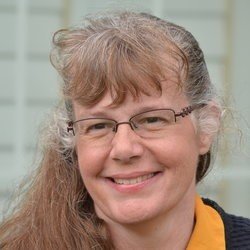
Author of Biblical fiction, married to my best friend, and challenged by eight sons’ growing pains as I write about what matters.
Receive weekly articles by giving your email address below:
